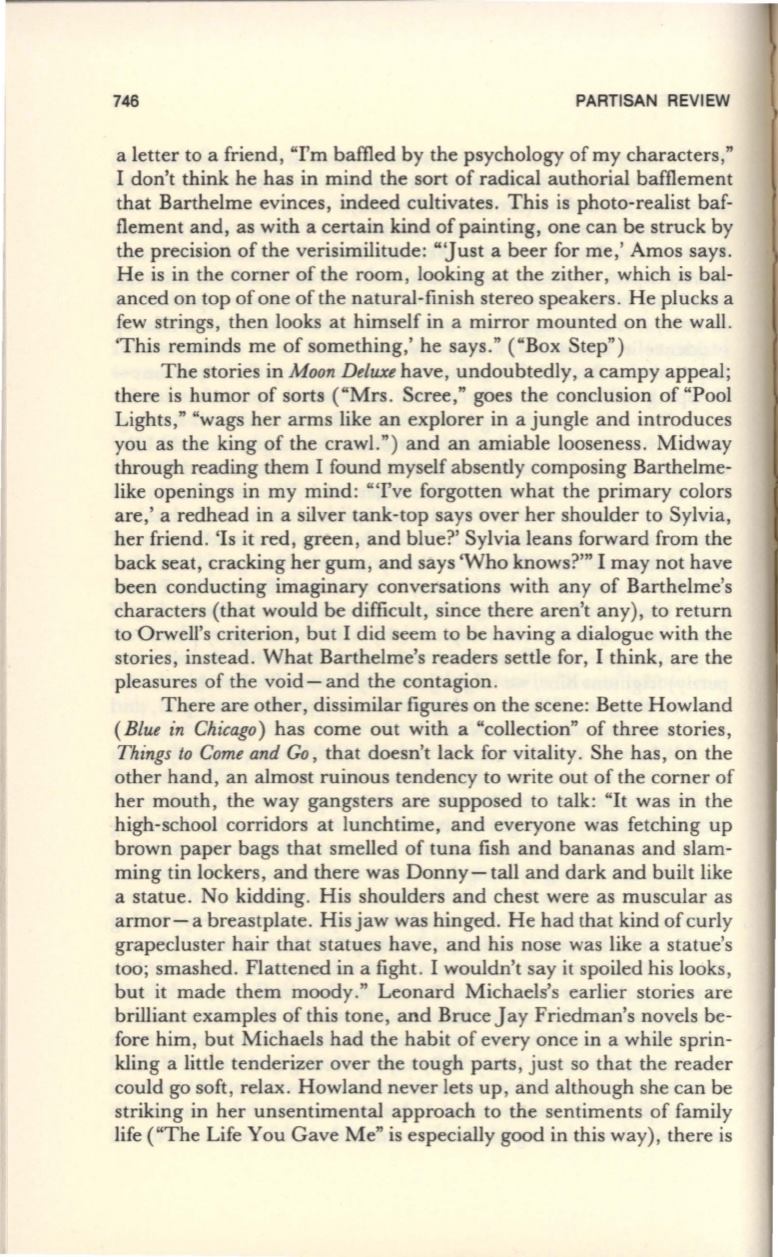
746
PARTISAN REVIEW
a letter to a friend, "I'm baffled by the psychology of my characters,"
I don't think he has in mind the sort of radical authorial bafflement
that Barthelme evinces, indeed cultivates. This is photo-realist baf–
flement and, as with a certain kind of painting, one can be struck by
the precision of the verisimilitude: "just a beer for me,' Amos says.
He is in the corner of the room, looking at the zither, which is bal–
anced on top of one of the natural-finish stereo speakers. He plucks a
few strings, then looks at himself in a mirror mounted on the wall.
'This reminds me of something,' he says." ("Box Step")
The stories in
Moon Deluxe
have, undoubtedly, a campy appeal;
there is humor of sorts ("Mrs. Scree," goes the conclusion of "Pool
Lights," "wags her arms like an explorer in a jungle and introduces
you as the king of the crawl.") and an amiable looseness. Midway
through reading them I found myself absently composing Barthelme–
like openings in my mind: "'I've forgotten what the primary colors
are,' a redhead in a silver tank-top says over her shoulder to Sylvia,
her friend. 'Is it red, green, and blue?' Sylvia leans forward from the
back seat, cracking her gum, and says 'Who knows?"' I may not have
been conducting imaginary conversations with any of Barthelme's
characters (that would be difficult, since there aren't any), to return
to Orwell's criterion, but I did seem to be having a dialogue with the
stories, instead. What Barthelme's readers settle for, I think, are the
pleasures of the void- and the contagion.
There are other, dissimilar figures on the scene: Bette Howland
(Blue in Chicago)
has come out with a "collection" of three stories,
Things to Come and Go,
that doesn't lack for vitality. She has, on the
other hand, an almost ruinous tendency to write out of the corner of
her mouth, the way gangsters are supposed to talk: "It was in the
high-school corridors at lunchtime, and everyone was fetching up
brown paper bags that smelled of tuna fish and bananas and slam–
ming tin lockers, and there was Danny-tall and dark and built like
a statue. No kidding. His shoulders and chest were as muscular as
armor- a breastplate. His jaw was hinged. He had that kind of curly
grapecluster hair that statues have, and his nose was like a statue's
too; smashed. Flattened in a fight. I wouldn't say it spoiled his looks,
but it made them moody." Leonard Michaels's earlier stories are
brilliant examples of this tone, and Bruce Jay Friedman's novels be–
fore him, but Michaels had the habit of every once in a while sprin–
kling a little tenderizer over the tough parts, just so that the reader
could go soft, relax. Howland never lets up, and although she can be
striking in her unsentimental approach to the sentiments of family
life ("The Life You Gave Me" is especially good in this way), there is


